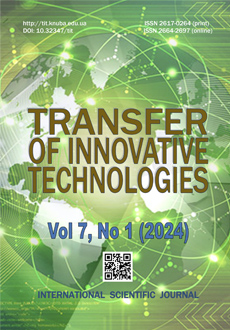The system of filling the information model of construction structural elements
DOI:
https://doi.org/10.32347/tit.2024.71.02.08Keywords:
Рroduct life cycle, laser scanning, cloud of points result, 3D digital model construction elemen, construction technology, craneless installation, information model, mechanized equipmentAbstract
The article considers the need for information filling of the digital model of the building object. The effectiveness of laser scanning for the real display of the state of building structures and their adequacy to the design data was noted. The effectiveness of laser scanning for the formation of a cloud of spatial points of objects for the further formation of a three-dimensional digital model was noted. Examples of laser scanning of building objects and subsequent reproduction using software of volumetric digital elements from the obtained point cloud are given. It is proposed to consider the filling system of the information model on the example of the developed technology of installation of the structural coating of light metal structures. On the basis of the developed installation technological equipment, control indicators, features of the installation technology, structural features of the building object are determined, which allows entering such data for consideration in the monitoring system of the installation process. All this together makes it possible to develop a generalized database of both the object as a whole and its components, which will take into account the
compliance of the manufactured structure with the design data, the preservation of its properties before the installation process, during installation during operation, strengthening, and disposal.
References
Sacks, R., Eastman, C., Lee, G., & Teicholz, P. (2018). BIM Handbook (3rd ed.). Wiley. Retrieved from https://www.perlego.com/book/2752742/bim-handbook-a-guide-to-building-information-modeling-for-owners-designers-engineers-contractors-and-facility-managers-pdf
Michael Chui, James Manyika, Jacques Bughin, Richard Dobbs, Charles Roxburgh, Hugo Sarrazin, Geoffrey Sands, and Magdalena Westergren.(2012) The social economy: Unlocking value and productivity through social technologies. https://www.mckinsey.com/industries/technology-media-and-telecommunications/our-insights/the-social-economy
Mukupa, W.; Roberts, G. W.; Hancock, C. M.; Al-Manasir, K. (2017): A Review of the Use of Terrestrial Laser Scanning Application for Change Detection and Deformation Monitoring of Structures. In: Survey Review 49(2017)353, 99 – 116.
Roman Shults, Khaini-Kamal Kassymkanova, Shugyla Burlibayeva, Daria Skopinova, Roman Demianenko, Yurii Medvedskyi. (2020) UAV Monitoring of Excavation Works. International Conference “Environmental Engineering”, 11th International Conference “Environmental Engineering”. С. 1-6 DOI: 10.3846/enviro.2020.696.
https://www.esri.com/en-us/what-is-gis/overview
https://www.autodesk.com/solutions/cad-software
Guidelines for performing work in the manufacture and assembly of building structures DSTU (2015) 2.6-203:2015
Mukupa, W.; Roberts, G. W.; Hancock, C. M.; Al-Manasir, K. (2017): A Review of the Use of Terrestrial Laser Scanning Application for Change Detection and Deformation Monitoring of Structures. In: Survey Review 49(2017)353, 99 – 116
Jacky C.K. Chow, Derek D. Lichti, and William F. Teskey (2012) Accuracy assessment of the faro focus3D and leica HDS6100 panoramic type terrestrial laser scanner through point-based and plane-based user self-calibration. FIG Working Week 2012: Knowing to manage the territory, protect the environment, evaluate the cultural heritage. Rome, Italy. May 6-10, 2012
Rudneva, I. (2021). Application of laser scanning for monitoring condition of buildings and structures during reconstruction . International Scientific Journal "Transfer of Innovative Technologies", 4(1), 33–36. https://doi.org/10.32347/tit2141.0106
Sharapa S.P., Tonkacheiev H.M., Lepska L.A. (2020) Methodology of construction technology. Education manual. – K.: KNUCA. – 220 p. (in Ukrainian)
Rashkivskyi, V. ., Dubovyk, I., & Zaiets, Y. . (2023). Development of an information model of the mechanized construction process of vertical constructions. Gіrnichі, budіvelnі, Dorozhnі Ta melіorativnі Mashini, (101), 36–43. https://doi.org/10.32347/gbdmm.2023.101.0303
Tonkacheiev H., Ignatenko O., Rashkivskyi V., Dubovyk I., Tryhub A., Sobko Yu. (2024). Development of the technology of crane-less lifting of long-span reinforced concrete and metal coatings. AD ALTA: Journal of Interdisciplinary Research (14/01-XL.), 271–275. https://doi.org/10.33543/j.140140.271275
Tonkacheev G., Rashkivskyi V., Rudnieva I., Dubovyk I. (2023) Investigation of labour intensity and duration of the assembly processes of structural covering blocks. Strength of Materials and Theory of Structures, 2023, number 110. DOI: 10.32347/2410-2547.2023.110.393-403
Khaddad, A., Riabchun, Y., Terenchuk, S., Yeremenko, B. Modeling of the intelligent system of searching associative images (2019) IEEE International Scientific-Practical Conference: Problems of Infocommunications Science and Technology, PIC S and T 2019 - Proceedings, 2019, pp. 439–442
Downloads
Published
How to Cite
Issue
Section
License
Copyright (c) 2024 Volodymyr Rashkivskyi, Roman Demianenko, Oleksandr Ignatenko, Yuri Zaiets

This work is licensed under a Creative Commons Attribution 4.0 International License.
Our journal abides by the CREATIVE COMMONS copyright rights and permissions for open access journals.
Authors, who are published in this journal, agree to the following conditions:
1. The authors reserve the right to authorship of the work and pass the first publication right of this work to the journal under the terms of a Creative Commons Attribution License, which allows others to freely distribute the published research with the obligatory reference to the authors of the original work and the first publication of the work in this journal.
2. The authors have the right to conclude separate supplement agreements that relate to non-exclusive work distribution in the form in which it has been published by the journal (for example, to upload the work to the online storage of the journal or publish it as part of a monograph), provided that the reference to the first publication of the work in this journal is included.




